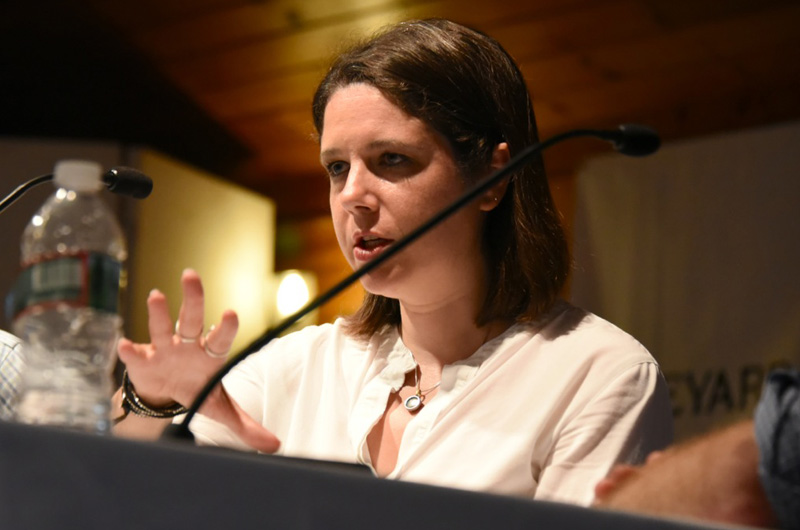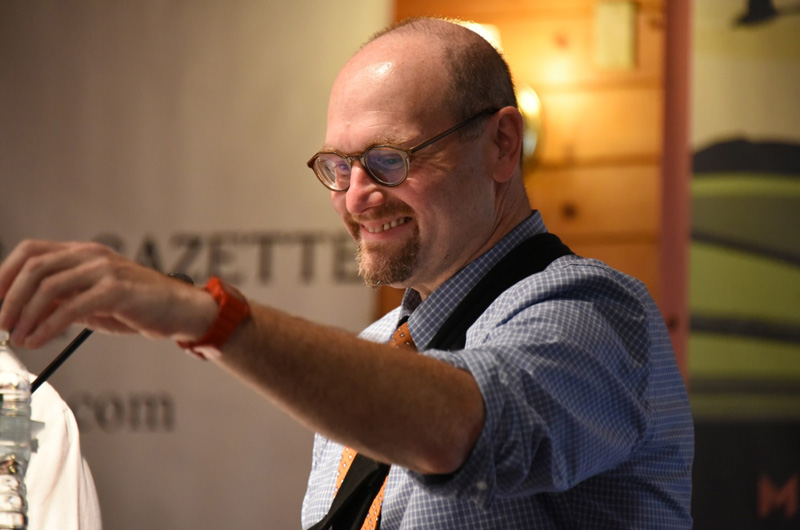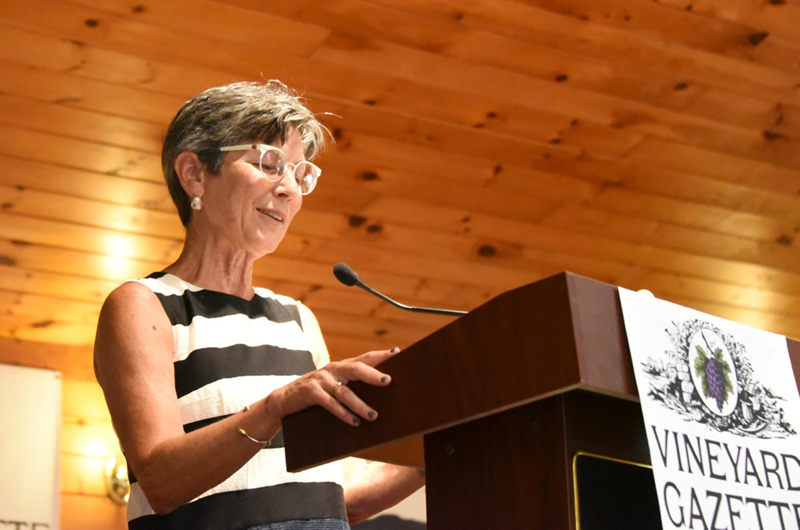Two leading journalists took a break from covering Donald Trump last week and spoke candidly about covering a White House that appears to operate more like a reality TV show than a seat of governance.
Ashley Parker of the Washington Post and Glenn Thrush of the New York Times ushered in the 2017 Martha’s Vineyard Book Festival on Friday, sharing some hard-won insight from their work as reporters.
Washington Post columnist and political commentator E.J. Dionne Jr. moderated the panel before a sold-out crowd at the Chilmark Community Center. The event was presented by the Gazette.
Audience members chuckled as Ms. Parker described an early-morning routine where she sets her alarm for every 15 minutes so she can monitor Mr. Trump’s Twitter account — a rotating shift that Post reporters call the hot seat.
“I pull my laptop into my bed and just start filing,” Ms. Parker said of the times when the President is awake and tweeting. She noted the importance of keeping track of those tweets given the incoming “fire hose of news” coming out of the White House.
The discussion covered topics ranging from infighting in the White House to the investigations into whether the Trump campaign colluded with Russia, and the continued urgency for journalists to collect the facts and hold power accountable.
“It is a central component of president Trump’s strategy — and prior to that the Republican strategy on the Hill . . . that the media is their central enemy,” Mr. Thrush said. “Particularly when no one has emerged in terms of the Democratic party to replace Hillary Clinton as a target.” He added that Republican politics has turned squarely toward the negative in recent years. During the campaign, he said, “anything that smacked of positivism or optimism was perceived as being false. What is the flip side of that? The way to win an election is to completely torch your opponent.”
That strategy appears to have continued this year, as evident in the contentious and often lampooned White House press briefings, where journalists find themselves having to defend their own questions and fight for information.
“When you are in the briefing room, the sense is that they want to have a fight every single day,” Mr. Thrush said. “They want you to step outside of your lane. They want you to join them in terms of spouting vitriol and getting personal in terms of the way that you respond to them. And more than anything else, they want your fame, celebrity or renown to be derivative of Donald Trump’s.”
Mr. Dionne noted that while battles between journalists and the White House can be expected from time to time, Mr. Trump has ushered in a new wave of aggression, with a “full-scale war” now being waged by the administration.
At the same time, battles within the White House itself further complicate the daily news cycle, with government officials sharing privileged information with the press, often to advance their own agendas.
Ms. Parker spoke about what she described as the “crumbling trust in democratic institutions,” where people in various fields seem free to choose their version of the facts. But she added that Mr. Trump did not create those conditions. “Trump was able to become president because people didn’t trust the media, and people didn’t trust these institutions,” she said.
Mr. Trump has derided the Russia investigations as a witch hunt and an effort to rob him of his victory. But Ms. Parker said he is correct that most voters don’t care. “It’s just not what animates these people, if you travel the country and talk to them,” she said.

Panelists agreed that the most damaging influence on the investigations has been the President himself, given his contradictory statements and apparent efforts to derail the investigation and cover up events that took place during the campaign.
“In a weird way, this is one of the most open and accessible administrations we have ever covered,” Ms. Parker said, noting among other things that Twitter creates a direct pipeline from the President to the public. But she also noted the confusion and anxiety that often results from those early morning tweets.
“Nobody knows what to make of this,” she said.
There were questions from the audience. One person asked how journalists can navigate what many perceive as efforts to use various scandals to distract from more important issues.
But the panelists questioned whether that is the case.
“At this point, I don’t think it’s intentional,” Ms. Parker said, adding that the distractions are often worse than the original issue.
Mr. Thrush agreed that calling it a strategy was going too far. “They are not that organized,” he said.
Answering a question about competition among news outlets — namely between the Post and the Times — the two reporters offered genuine expressions of mutual respect for their colleagues.
“Competition thus far is bringing out the best,” said Mr. Thrush. Ms. Parker agreed, noting that the news atmosphere feels invigorating, with reporters scrutinizing their competitors and jockeying for the next big story. (“Scoop o’clock” is what they say at the Post, she said.)
The evening was not entirely devoted to politics. At the outset Mr. Dionne thanked the Vineyard for being such a welcoming place, describing his experience getting lost during an afternoon walk and being aided by friendly Islanders.
During the question period, a woman who described herself as a mother, teacher and American drew applause when she thanked the panel for their work “on the front lines.”
Audience member Bari Boyer asked: “If all the briefings are full of lies and non-facts, why do you keep going?”
Ms. Parker responded that there is news value in attending briefings, whatever they hold in store for the reporter. “If they lie to you or they don’t provide statistics or they offer spin, I think that’s useful information for us to have in terms of understanding the White House,” she said. “I’m never going to turn down face time with a member of the administration.”
Mr. Thrush agreed. “I’m not walking away from a fight,” he said of efforts to pit one institution against another. “It’s not just a matter of us asking questions and jotting a list of answers. It’s about us telling these people who are lying to us every single day: We’re not going away.”










Comments
Comment policy »